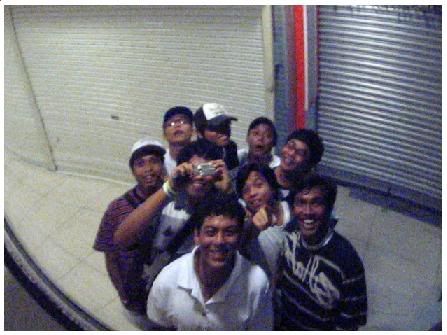Many act differently when they are interacting on the internet. The reality of not being able to see the other human being and vice-versa makes one bolder and the more decisive. Some could even cursed you on the net and act like they never when you meet eye-to-eye. An example to show is the phenomenon of chatting. One would be having an extroverted relation and interaction through the net medium but when they bump into each other outside in the real world, they could simply switch off and pretend not to know each other even though they know how that person looks like either through file sharing pics or personal web-page. As a matter of fact they would only tend to thier net friends only on the net because there's where they got to know each other and some will continue to do so, cause' they feel its enough that way. The lines are spacebar-ed and the full-stops are caps lock-ed!
The first thing to realize is that Internet-world is part of reality. The people you correspond with on the network are real people with lives and careers and habits and feelings of their own. Things you say on the net can make you friends or enemies, famous or notorious, included or ostracized. You need to take the electronic part of your life seriously. In particular, you need to think about and consciously choose how you wish to use the network. Regard electronic mail as part of a larger ecology of communication media and genres -- telephone conversations, archival journals and newsletters, professional meetings, paper mail, voice mail, chatting in the hallway, lectures and colloquia, job interviews, visits to other research sites, and so forth -- each with its own attributes and strengths. The relationships among media will probably change and new genres will probably emerge as the technologies evolve, but make sure that you don't harbor the all-too-common fantasy that someday we will live our lives entirely through electronic channels. It's not true.
One might engage in many forms of communication on the net -- one-to-one electronic correspondence, network discussion groups, Web publishing, MSN and so forth. And these interactions might be employed as part of a wide variety of professional activities: sharing raw data, arguing about technical standards, collaborating on research projects, chasing down references, commenting on drafts of papers, editing journals, blogging, planning meetings and trips, and so on. Underlying all of these disparate activities, though, is the activity of building and maintaining professional relationships. Electronic communication is wasted unless we use it to seek out, cultivate, and nurture relationships with other human beings. Unfortunately the existing mechanisms for electronic interactions, by reducing people to abstract codes (like coincidence_enthusiast@hotmail.com) and the phenomenon of he-can't-see-me notion, make it difficult to keep this deeper dimension of interaction in mind. Still, there's no escaping it: if you aren't consciously building relationships, you're probably getting lost.
:( Do this means Happy or
:) Do this means Sad?
The Photobucket server is down again, so will my pictures. I feel like cursing and being mad over it but hey! its' hosted for free. Who am i to be mad over a free host that is adding to the extra features and doing service to we'all...netizens.
at questioned-ease
The first thing to realize is that Internet-world is part of reality. The people you correspond with on the network are real people with lives and careers and habits and feelings of their own. Things you say on the net can make you friends or enemies, famous or notorious, included or ostracized. You need to take the electronic part of your life seriously. In particular, you need to think about and consciously choose how you wish to use the network. Regard electronic mail as part of a larger ecology of communication media and genres -- telephone conversations, archival journals and newsletters, professional meetings, paper mail, voice mail, chatting in the hallway, lectures and colloquia, job interviews, visits to other research sites, and so forth -- each with its own attributes and strengths. The relationships among media will probably change and new genres will probably emerge as the technologies evolve, but make sure that you don't harbor the all-too-common fantasy that someday we will live our lives entirely through electronic channels. It's not true.
One might engage in many forms of communication on the net -- one-to-one electronic correspondence, network discussion groups, Web publishing, MSN and so forth. And these interactions might be employed as part of a wide variety of professional activities: sharing raw data, arguing about technical standards, collaborating on research projects, chasing down references, commenting on drafts of papers, editing journals, blogging, planning meetings and trips, and so on. Underlying all of these disparate activities, though, is the activity of building and maintaining professional relationships. Electronic communication is wasted unless we use it to seek out, cultivate, and nurture relationships with other human beings. Unfortunately the existing mechanisms for electronic interactions, by reducing people to abstract codes (like coincidence_enthusiast@hotmail.com) and the phenomenon of he-can't-see-me notion, make it difficult to keep this deeper dimension of interaction in mind. Still, there's no escaping it: if you aren't consciously building relationships, you're probably getting lost.
:( Do this means Happy or
:) Do this means Sad?
The Photobucket server is down again, so will my pictures. I feel like cursing and being mad over it but hey! its' hosted for free. Who am i to be mad over a free host that is adding to the extra features and doing service to we'all...netizens.
at questioned-ease



